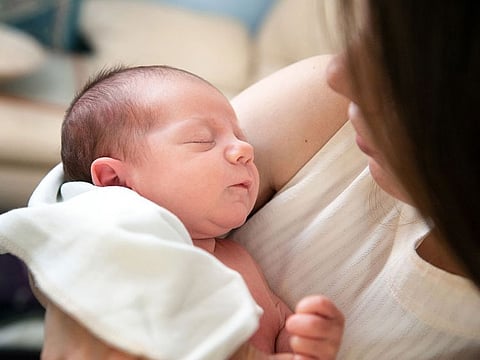Conscious parenting: Should you ask your child for permission to change their diaper?
Conscious parenting requires a parent to access their own traumas and old wounds

It’s easy to fall into old habits that we are familiar with in parenting. Conscious parenting challenges that. We asked Jasmine Collin, a Dubai-based conscious parenting coach, about what the term actually means, what it does NOT entail, and how right are the proponents who call for asking permission before bathing or changing your child’s diapers. Here’s what she has to say:
What is conscious parenting?
Conscious parenting is really just about being more aware and mindful of how we are interacting with our children, how we are speaking to them, what we believe about children and what values are driving our parenting style. It’s really just about having conscious awareness of how we want to be as parents and how we want our relationship to be with our child during the early years and also when they grow up.
If we don’t examine what we are doing, it kind of just happens by default … we end up parenting like we were parented. Which is why we end up sounding like our parents even though we swore we wouldn’t.
Conscious parenting is just about being aware and seeing the child as an individual instead of just an extension of ourselves.
What’s the difference between authoritative and conscious parenting?
Authoritative is that kind of sweet spot between authoritarian – which is obviously about power over children; it’s very traditional and children are not really heard – and permissive, which is like the pendulum swinging the other way, where there’s no structure. And neither of those is particularly secure and healthy for the child. Authoritative is just in the middle and I think conscious parenting is very similar. It just takes things up a notch.
How do you know you are a conscious parent?
It’s a journey; you don’t wake up and decide to be a conscious parent one day. There’s always another layer to uncover; it’s about being open to that journey and about uncovering each layer as it comes. I guess the key questions would be, ‘Am I really making most of the challenges that come up on a daily, weekly, monthly basis?’ and ‘Am I seeing them as opportunities for my own personal growth?’ Because those are the little bread crumbs that our children leave for us. Analyse and you’ll know if you are on the conscious parenting path.
There’s also a myth that conscious parents are naturally calm and patient – we are not usually. It’s about learning from those opportunities and challenges [parenthood provides] to help us deal with our own traumas, unmet needs and wounds from our childhood.

What are the myths surrounding conscious parenting?
First, that it’s permissive. It’s not permissive – there are lots of other names like gentle parenting, peaceful parenting – and I think there might be that conception that it’s about permissiveness and just letting our children run free; it’s much harder than that. You have to really examine yourself, you have to go through your own trauma and you have to do the work on yourself.
There’s also a myth that conscious parents are naturally calm and patient – we are not usually. It’s about learning from those opportunities and challenges [parenthood provides] to help us deal with our own traumas, unmet needs and wounds from our childhood. It’s deep and meaningful, and hard at times.
How important is it for both parents to have the same parenting style?
Very! I think whatever the styles – if they are doing it different, that’s a really difficult time for them in their relationship with each other but also with their children, because it sends mixed messages; there are gaps in the boundaries and children will find the gaps. It can create a lot of conflict.
I probably went down this path earlier than my husband and I dragged him along with me, but I think when you get a couple talking about it, they pretty much agree on where they want to go.
Should you ask for permission before changing your newborn’s diaper or giving him or her a bath?
I think it’s a fairly good idea to include your children in what’s going on in their daily lives with their bodies. So whether it’s narrating, like, ‘Now I’m going to change your nappy’ or asking before doing it, it’s great to think about that new person as an individual in their own right, and I think when you are narrating like that or you are asking for permission, you are already doing that, so you are less likely to impose your will on them when they get older. It’s a really good idea to get started with the idea the baby is an individual and they deserve your respect right from the beginning, rather than they are just objects.
Have a topic you'd like us to discuss? Write to us at parenting@gulfnews.com
Sign up for the Daily Briefing
Get the latest news and updates straight to your inbox



